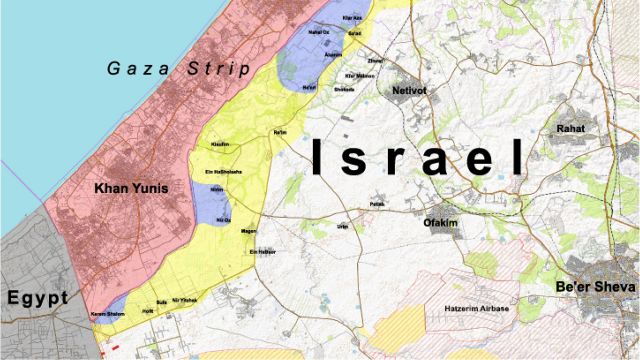Updated on October 18, 2023.
In the early morning hours on October 7, the Islamist terrorist organization Hamas launched a large-scale, coordinated attack on southern Israel. Thousands of rockets were fired on civilian targets, including a crowded music festival near Gaza, as armed militants crossed the Israeli border by boat, in trucks, and from the air in motorized paragliders.
More than 1,000 Israelis were reportedly killed in the assault, and at least 100 civilians and soldiers were taken hostage. Among those captured are women and children as well as older and disabled people.
“These events have resulted in horrific scenes of violence and many Israeli fatalities and injuries, with many believed to be kidnapped inside the [Gaza] Strip,” said Tor Wennesland, United Nation’s (UN) Special Coordinator for the Middle East Peace Process, in a news release. “These are heinous attacks targeting civilians and must stop immediately.”
The unprecedented attacks prompted Israeli to declare a state of war and initiate counterstrikes against Hamas, which have claimed the lives of more than 800 Palestinians. The death toll is expected to rise as fighting in the region continues. Thousands have also been injured, and more than 123,000 people have been displaced in Gaza, according to a report from the United Nations Office for the Coordination of Humanitarian Affairs (OCHA).
As events unfold, public health experts have expressed growing concerns over the need for essential medical supplies and humanitarian relief in the region. People around the world have been watching the events unfold in real time—feeling powerless to help or make a difference. Here are some ways you can help today:
The International Committee of the Red Cross (ICRC) has been on the ground in Israel and the occupied territories for nearly four decades. An independent, humanitarian organization, the ICRC visits detainees in the region and works to improve access to water, energy, and other essential services. The group says its mission involves “ensuring humanitarian protection and assistance for victims of armed conflict and other situations of violence.” The Hamas attacks resulted in a halt of food and energy supplies from Israel into Gaza. The ICRC says its teams are ready to provide health care, clean water, and electricity. The group dispatched medical supplies to hospitals in Gaza and will provide additional humanitarian assistance as required on both sides.
How to help
World Central Kitchen (WCK) is currently working to support families affected by the conflict in Israel and Gaza by providing emergency food relief. The group is also monitoring acitivty along the borders of neighboring countries in ancitipation of a flow of refugees. WCK partners with organizations on the ground and has a network of restaurants, food trucks, and emergency kitchens that offer fresh, nutritious meals to those in need.
How to help
The International Rescue Committee (IRC) helps people affected by humanitarian crises. In the wake of the Hamas attack on Israel and the resulting retaliatory strikes, the group says it is “assessing needs on the ground and IRC's capacity to ensure critical, life-saving humanitarian relief reaches affected civilian populations.” The group is also calling on all parties involved to uphold their legal obligations to ensure humanitarian access to those affected.
How to help
Doctors Without Borders has had a presence in Gaza for 20 years. The independent and impartial humanitarian organization provides health care and psychological assistance to civilians affected by the ongoing conflict in Palestinian Territories. The group is donating essential medical supplies to hospitals and health facilities in Gaza.
How to help
Save the Children: Children's Emergency Fund has been working with children affected conflict between Palestinian armed groups and Israeli forces since 1953. The group estimates that more than 2.4 million people in the region need humanitarian assistance, including 1.2 million children. The goal of the organization is to ensure children survive, learn, and receive protection from all types of abuse. Donations will help provide young people with warm blankets, nutritious food, shelter, and legal services for sexual violence.
How to help
The Israeli Trauma Center for Victims of Terror and War (NATAL) is a nonprofit organization that offers mental health treatment around PTSD and other trauma related to war and terror. Among the group’s goals is to provide trauma prevention, intervention, and guidance in Israeli communities during times of crisis.
How to help
The Carter Center, which was founded by former President Jimmy Carter and his wife Rosalynn Carter in partnership with Emory University, works to provide humanitarian aid and has been advocating for a viable two-state solution to the Israeli-Palestinian conflict for decades. In an October 8 statement, the Carter Center strongly condemned the targeting of Israeli and Palestinian civilians, calling for “genuine dialogue as well as international collective action to halt hostilities in the region.”
How to help







